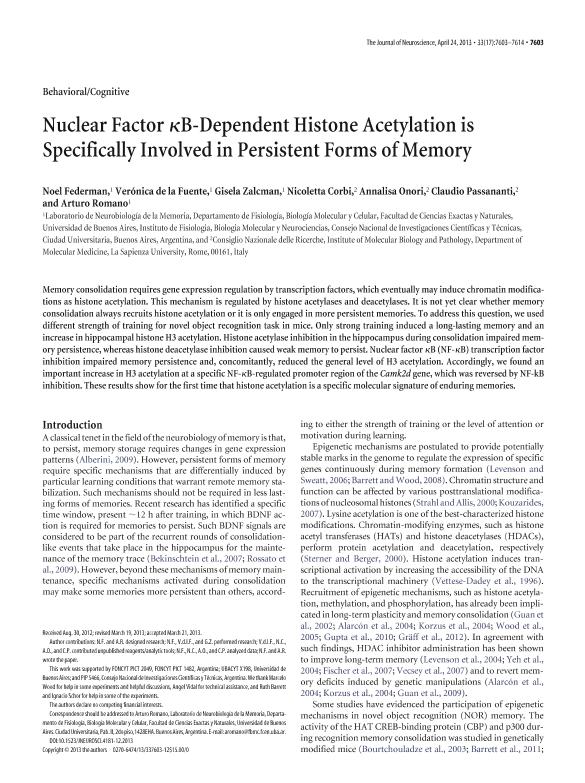Artículo
Nuclear factor κB-dependent histone acetylation is specifically involved in persistent forms of memory
Federman, Maria Noel ; de la Fuente, Verónica
; de la Fuente, Verónica ; Zalcman, Gisela Patricia
; Zalcman, Gisela Patricia ; Corbi, Nicoletta; Onori, Annalisa; Passananti, Claudio; Romano, Arturo Gabriel
; Corbi, Nicoletta; Onori, Annalisa; Passananti, Claudio; Romano, Arturo Gabriel
 ; de la Fuente, Verónica
; de la Fuente, Verónica ; Zalcman, Gisela Patricia
; Zalcman, Gisela Patricia ; Corbi, Nicoletta; Onori, Annalisa; Passananti, Claudio; Romano, Arturo Gabriel
; Corbi, Nicoletta; Onori, Annalisa; Passananti, Claudio; Romano, Arturo Gabriel
Fecha de publicación:
04/2013
Editorial:
Society for Neuroscience
Revista:
Journal of Neuroscience
ISSN:
0270-6474
Idioma:
Inglés
Tipo de recurso:
Artículo publicado
Clasificación temática:
Resumen
Memory consolidation requires gene expression regulation by transcription factors, which eventually may induce chromatin modifications as histone acetylation. This mechanism is regulated by histone acetylases and deacetylases. It is not yet clear whether memory consolidation always recruits histone acetylation or it is only engaged in more persistent memories. To address this question, we used different strength of training for novel object recognition task in mice. Only strong training induced a long-lasting memory and an increase in hippocampal histone H3 acetylation. Histone acetylase inhibition in the hippocampus during consolidation impaired memory persistence, whereas histone deacetylase inhibition caused weak memory to persist. Nuclear factor κB (NF-κB) transcription factor inhibition impaired memory persistence and, concomitantly, reduced the general level of H3 acetylation. Accordingly, we found an important increase in H3 acetylation at a specific NF-κB-regulated promoter region of the Camk2d gene, which was reversed by NF-kB inhibition. These results show for the first time that histone acetylation is a specific molecular signature of enduring memories.
Palabras clave:
Epigenetc
,
Memory
,
NF-kB
,
Acetylation
Archivos asociados
Licencia
Identificadores
Colecciones
Articulos(IFIBYNE)
Articulos de INST.DE FISIOL., BIOL.MOLECULAR Y NEUROCIENCIAS
Articulos de INST.DE FISIOL., BIOL.MOLECULAR Y NEUROCIENCIAS
Citación
Federman, Maria Noel; de la Fuente, Verónica; Zalcman, Gisela Patricia; Corbi, Nicoletta; Onori, Annalisa; et al.; Nuclear factor κB-dependent histone acetylation is specifically involved in persistent forms of memory; Society for Neuroscience; Journal of Neuroscience; 33; 17; 4-2013; 7603-7614
Compartir
Altmétricas



